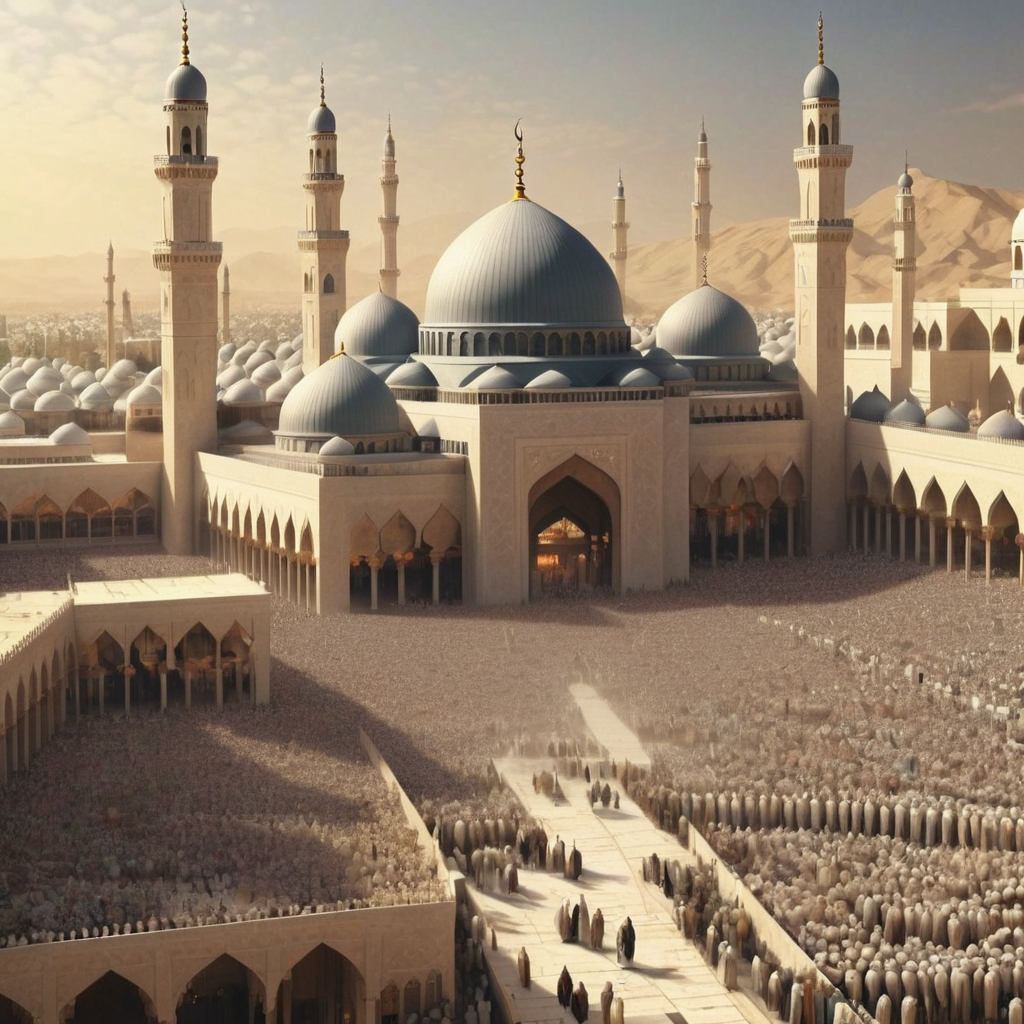Table of Contents
Introduction to Prophet Muhammad
Prophet Muhammad, born in Mecca around 570 CE, stands as a central figure in Islam, revered for his role in the foundation of one of the world’s major religions. His full name was Muhammad ibn Abdullah, and he hailed from the respected Quraysh tribe. Orphaned at a young age, Muhammad was raised by his grandfather, Abdul Muttalib, and later by his uncle, Abu Talib. These early years in Mecca were marked by an environment steeped in trade and polytheistic traditions, which would later contrast sharply with his monotheistic revelations.
The biography of Mohamed Prophet reveals a man of profound spirituality and dedication to the principles he espoused. His early career as a merchant earned him a reputation for honesty and integrity. These traits were so prominent that he was given the nickname “Al-Amin,” meaning “the Trustworthy.” At the age of 25, he married Khadijah, a wealthy widow who became his steadfast supporter and the first convert to Islam. This union provided him with both emotional and financial stability, allowing him to focus on his spiritual pursuits.
Prophet Muhammad’s significance extends beyond his life into the vast expanse of Islamic beliefs. He is regarded as the final prophet in a long line of messengers sent by Allah, the one true God, to guide humanity. His teachings, encapsulated in the Quran, and his actions, known as the Sunnah of the Prophet, form the bedrock of Islamic spirituality and practice. The revelations of the Prophet Muhammad, which began in 610 CE with the first encounter with the angel Gabriel, marked the beginning of a transformative era in religious history.
Understanding the life of Prophet Muhammad is crucial for comprehending the broader context of Islamic teachings and the profound impact he has had on millions of believers worldwide. His legacy endures in the rituals, laws, and cultural norms that define Muslim life, and his influence continues to be a cornerstone of Islamic identity and history.

Early Life and Background
Prophet Muhammad, born in 570 CE in the city of Mecca, holds a significant place in the history of Islam. His early life was marked by both hardship and resilience. Muhammad’s father, Abdullah, passed away before his birth, and his mother, Amina, died when he was just six years old. These tragic losses led to him being cared for by his grandfather, Abdul Muttalib, and later by his uncle, Abu Talib. Despite these early adversities, Muhammad’s upbringing in Mecca was instrumental in shaping his character and future.
Mecca, a bustling trade center, provided young Muhammad with a diverse cultural and economic environment. As a youth, he worked as a shepherd and later embarked on a career as a merchant. His integrity and honesty in business dealings earned him the epithet ‘Al-Amin,’ meaning ‘the trustworthy.’ This reputation was not merely a testament to his personal ethics but also reflected the high regard in which he was held by the Meccan society.
Muhammad’s early career as a merchant exposed him to various cultures and religious beliefs. These experiences played a crucial role in his spiritual development and understanding of the world. The life of Prophet Muhammad during these formative years laid the groundwork for his future role as a spiritual leader and the proclaimer of Quranic teachings. His interactions with diverse communities and his unwavering commitment to honesty and integrity were cornerstones of his character, which later translated into his teachings and the Sunnah of the Prophet.
The early life and background of Muhammad are not only pivotal in understanding his personal journey but also provide insight into the broader context of the history of Islam. His experiences as a young man in Mecca, coupled with the loss of his parents and the guidance of his grandfather and uncle, significantly influenced the teachings of Prophet Muhammad and his approach to Islamic spirituality.
Revelation and the Call to Prophethood
At the age of 40, Muhammad experienced a transformative moment that would alter the course of history. This pivotal event took place in the Cave of Hira, where Muhammad often retreated for meditation and reflection. It was during one of these solitary retreats that the angel Gabriel appeared to him, delivering the first revelation from Allah. The words imparted to Muhammad were, “Read in the name of your Lord who created—created man from a clot. Read, and your Lord is the most Generous—who taught by the pen—taught man that which he knew not” (Quran 96:1-5). These verses, known as the first revelation of the Quran, marked the beginning of Muhammad’s mission as a prophet.
The initial revelation was both profound and overwhelming for Muhammad. Upon receiving it, he returned home in a state of great agitation. His wife, Khadijah, provided him with unwavering support and reassurance. Recognizing the gravity of the experience, Khadijah sought counsel from her cousin, Waraqa ibn Nawfal, a learned Christian scholar. Waraqa affirmed that Muhammad had indeed received a divine message similar to those given to earlier prophets. This validation fortified Muhammad’s resolve to embrace his role as the messenger of Allah.
Muhammad began to share his revelations with his immediate family and close friends. His early followers, including Khadijah, his cousin Ali, his friend Abu Bakr, and his adopted son Zaid, were instrumental in the nascent stages of the Islamic faith. The teachings of Prophet Muhammad, conveyed through these initial revelations, emphasized monotheism, moral rectitude, and social justice, which would become the core principles of Islamic beliefs.
These profound revelations not only marked the genesis of Muhammad’s prophetic mission but also laid the foundations for the Quranic teachings that continue to guide millions of Muslims worldwide. The history of Islam is intrinsically linked to this moment, underscoring the significance of the revelations of Muhammad and their enduring impact on Islamic spirituality and the broader course of human civilization.
The Early Muslim Community in Mecca
The early years of Islam in Mecca were marked by significant challenges and profound resilience. The nascent Muslim community, led by Prophet Muhammad, began with a small group of followers who embraced the revelations of the Prophet. This period was defined by the transformative teachings of Prophet Muhammad, which emphasized monotheism, justice, and moral integrity. These teachings posed a direct challenge to the existing social, economic, and political structures dominated by the Quraysh tribe, who controlled Mecca.
The Quraysh, threatened by the growing influence of Islam, responded with a series of actions aimed at undermining the new faith. Persecution became a common experience for early Muslims, who faced verbal and physical assaults, social ostracism, and economic boycotts. Despite these hardships, the commitment of Prophet Muhammad and his followers did not waver. Key figures such as Abu Bakr, Ali ibn Abi Talib, and Khadijah, the Prophet’s wife, played crucial roles in supporting and spreading the message of Islam during these trying times.
One notable event during this period was the boycott imposed by the Quraysh, which aimed to isolate the Muslims and force them into submission. The boycott, which lasted for three years, restricted trade and social interactions with the Muslim community. This period of severe hardship tested the resolve of the early Muslims but also strengthened their unity and faith. The revelations of Prophet Muhammad during this time provided spiritual solace and guidance, reinforcing the core beliefs and practices that would form the foundation of Islamic spirituality.
The early Muslim community in Mecca laid the groundwork for the future expansion of Islam. Despite facing numerous adversities, their unwavering faith and dedication to the teachings of Prophet Muhammad ensured the survival and growth of the religion. The early struggles and triumphs of the Muslim community in Mecca are a testament to the enduring impact and significance of Prophet Muhammad’s legacy in the history of Islam.
Migration to Medina: The Hijra
The Hijra, or migration to Medina, marks a pivotal moment in the history of Islam. The Prophet Muhammad and his followers faced increasing persecution in Mecca, primarily due to their monotheistic beliefs which clashed with the prevalent polytheistic practices. This hostile environment compelled Muhammad to seek a safer haven for his followers, leading to the momentous decision to migrate to Medina, then known as Yathrib.
The planning and execution of the Hijra were meticulous, involving clandestine meetings and carefully coordinated movements. Prophet Muhammad, accompanied by his close companion Abu Bakr, undertook this perilous journey in 622 CE. They traveled by night and hid by day to evade the detection of the Quraysh, the dominant tribe in Mecca. Their journey covered approximately 320 kilometers, culminating in their safe arrival in Medina.
The significance of the Hijra in Islamic history cannot be overstated. It represents not just a physical journey but also a profound spiritual and communal transformation. Upon arrival, Muhammad was warmly received by the people of Medina, who pledged their support and protection. This marked the establishment of the first Muslim community, or Ummah, where the teachings of Prophet Muhammad could be freely practiced and disseminated.
In Medina, Muhammad’s leadership saw the integration of various tribal factions into a cohesive society rooted in Islamic principles. The Charter of Medina, often cited as the first written constitution, outlined the rights and duties of all citizens, ensuring mutual respect and harmony among the diverse population. This period also saw significant revelations of the Quran, further shaping the core beliefs and practices of Islam.
The Hijra thus stands as a testament to the resilience and strategic acumen of Prophet Muhammad. It laid the foundation for the spread of Islamic spirituality and the formation of a unified Muslim identity. The legacy of this migration continues to resonate, symbolizing the enduring impact of Muhammad’s life and the transformative power of his teachings.
The Establishment of the Islamic State
The transition from Mecca to Medina marked a significant turning point in the life of Prophet Muhammad, transforming him from a solely religious leader to a multifaceted statesman and military commander. Upon his arrival in Medina, Muhammad undertook the monumental task of uniting the diverse and often fractious tribes. This endeavor culminated in the creation of the Constitution of Medina, a seminal document that outlined the rights and duties of the Muslim, Jewish, and pagan communities, thereby establishing a cohesive socio-political framework.
The Constitution of Medina served as the bedrock for the nascent Islamic state, promoting principles of justice, mutual defense, and collective responsibility. Under Muhammad’s leadership, these principles were not merely theoretical but were actualized through various social and legal reforms. The Sunnah of the Prophet, encompassing his actions and sayings, became a guiding compass for the community, setting precedents in matters ranging from trade and family law to crime and punishment.
The period in Medina also saw a series of pivotal military engagements that tested and solidified the new Islamic state. Key battles like those of Badr, Uhud, and the Trench demonstrated not only Muhammad’s strategic acumen but also the resilience and growing unity of the Muslim community. These conflicts, while challenging, ultimately strengthened the resolve and solidarity of Muhammad’s followers.
Equally noteworthy are the diplomatic initiatives undertaken by Muhammad, most notably the Treaty of Hudaybiyyah. This treaty, signed with the Quraysh tribe of Mecca, was a landmark achievement in Islamic diplomacy. It established a ten-year truce, allowing Muslims to practice their faith freely and paving the way for the peaceful conquest of Mecca. The treaty exemplified Muhammad’s preference for negotiation and peace over prolonged conflict, highlighting his pragmatic approach to statecraft.
In addition to military and diplomatic achievements, Muhammad’s time in Medina was marked by significant social reforms. These included the promotion of charity, the fair treatment of women and slaves, and the establishment of a system of zakat (almsgiving) to support the needy. The Quranic teachings and the Prophet’s own example laid the foundation for an equitable society, reflecting the core Islamic beliefs of justice and compassion.
Through these multifaceted efforts, Prophet Muhammad not only established an Islamic state but also left an enduring legacy that continues to influence Islamic spirituality, governance, and social justice. The period in Medina stands as a testament to his unparalleled ability to harmonize religious, social, and political spheres, shaping the course of Islamic history profoundly.
Conquest of Mecca and the Final Years
The conquest of Mecca stands as a pivotal moment in the life of Prophet Muhammad and the history of Islam. This event, which took place in 630 CE, marked the culmination of years of conflict and negotiation. Following a breach of the Treaty of Hudaybiyyah by the Quraysh, Prophet Muhammad gathered an army of approximately 10,000 followers and set forth towards Mecca. The strategy employed was one of minimal bloodshed; a testament to the Prophet’s desire for peace and reconciliation.
Upon arrival, the city of Mecca surrendered with little resistance, recognizing the overwhelming support for the Prophet. The significance of this event cannot be overstated. It was not merely a military victory but a profound spiritual and social transformation. Upon entering the city, Prophet Muhammad declared a general amnesty, sparing the lives of his former adversaries and showcasing the core Islamic principles of mercy and forgiveness. The Kaaba, the sacred house of worship, was cleansed of idols, reinstating the monotheistic worship of Allah, which is central to Islamic beliefs.
The conquest of Mecca effectively consolidated the Islamic state, uniting the tribes of Arabia under the banner of Islam. This unity was further solidified by the Prophet’s exemplary leadership and the implementation of Quranic teachings. His actions during this period emphasized the sunnah of the Prophet, highlighting his commitment to justice, compassion, and the well-being of the community.
In the final years of his life, Prophet Muhammad continued to impart the teachings of Islam, focusing on establishing a just and moral society. His last sermon, delivered during the Hajj pilgrimage in 632 CE, encapsulated the essence of Islamic spirituality and ethical conduct. He emphasized the importance of equality, human rights, and adherence to the Quran and Sunnah. Shortly after, Prophet Muhammad fell ill and passed away in the same year, leaving behind a legacy that has profoundly impacted the course of history.
The life of Prophet Muhammad, from the revelations of the Prophet to his final years, provides a comprehensive guide for Muslims. His legacy continues to inspire millions, and his teachings remain a cornerstone of Islamic spirituality and practice.
Legacy and Impact of Prophet Muhammad
Prophet Muhammad’s life and teachings continue to resonate profoundly across the world, shaping not only Islamic theology but also law, culture, and societal norms. His influence extends far beyond the religious domain, permeating various aspects of daily life for millions of Muslims. The Sunnah of the Prophet, which encompasses his practices and sayings, serves as a model for ethical and moral conduct. These teachings are meticulously preserved in the Hadith literature and have been instrumental in the formulation of Sharia, the Islamic legal system.
In the realm of Islamic beliefs, the revelations of Prophet Muhammad, as recorded in the Quran, form the cornerstone of faith. These Quranic teachings advocate for justice, compassion, and the pursuit of knowledge, themes that are integral to Islamic spirituality. The biography of Mohamed Prophet provides a comprehensive understanding of his role as a leader, a statesman, and a spiritual guide. By examining his life, one appreciates the profound impact he had on the nascent Muslim community and his enduring legacy in the history of Islam.
The significance of Prophet Muhammad is not confined to historical contexts; his teachings continue to influence contemporary Muslim thought and practice. His emphasis on community welfare, social justice, and ethical behavior remains relevant, offering guidance in an ever-changing world. The impact of Prophet Muhammad is evident in the establishment of various educational, charitable, and social institutions that draw inspiration from his principles.
For both Muslims and non-Muslims, understanding the life and legacy of Prophet Muhammad is crucial. It fosters a deeper appreciation of Islamic culture and spirituality and promotes intercultural dialogue and mutual respect. The history of Mohamed Prophet offers invaluable insights into the development of one of the world’s major religions and highlights the enduring relevance of his message in fostering a more just and compassionate world.
more: Who is the Most Famous Person in the World? (allmediatrend.com)






1 Comment
Pingback: Who is the Most Famous Person in the World?